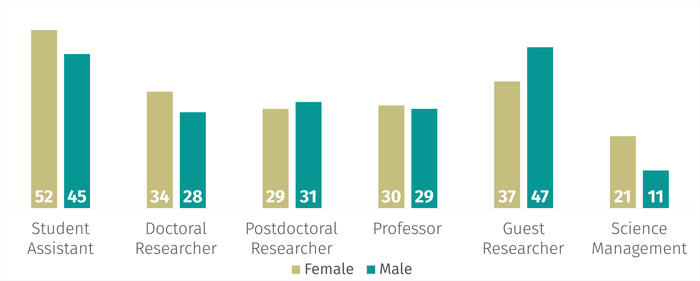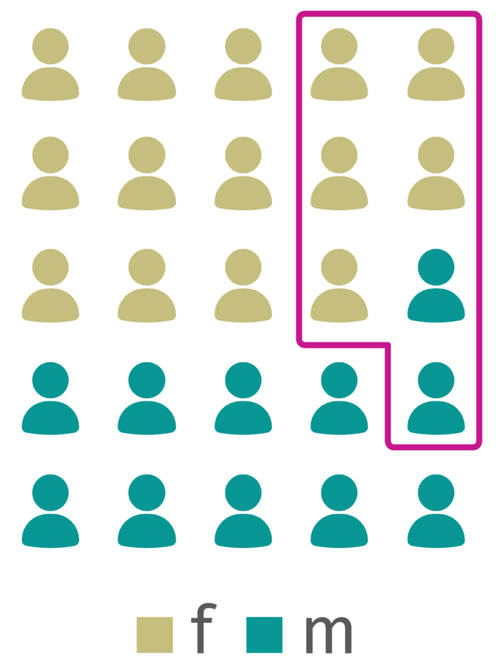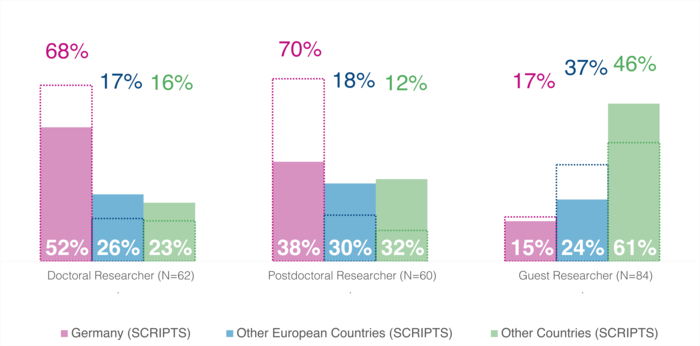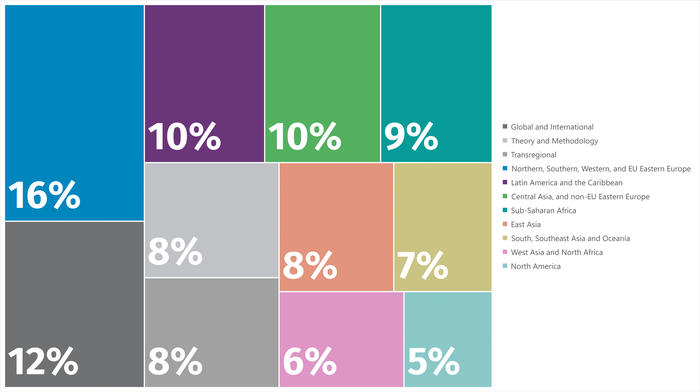SCRIPTS Diversity in Numbers
The QMD Unit collects data on various dimensions of diversity within SCRIPTS to better understand our cluster and its diversity dynamics. (Learn more about our understanding of diversity at SCRIPTS here.) Below, we provide insights into how our HR measures have contributed to the diverse composition of SCRIPTS. We highlight key milestones from the first phase of the cluster, showcasing our efforts. These insights serve as a foundation for continuous reflection and improvement in our diversity strategies.
Gender*
Gender distribution across status groups in the period 2019–2024 shows some variation. Female representation is highest among Student Assistants, while male representation dominates among Guest Researchers. Other groups, such as Professors and Postdoctoral Researchers, exhibit near gender parity—a distinction that sets SCRIPTS apart from comparable DFG-funded formats (e.g. Clusters of Excellence, Research Training Groups and Collaborative Research Centres). The overrepresentation of males in the Guest Researcher category reflects the gender imbalances present in the respective academic systems, as well as the gendered impact on researcher mobility, particularly during the COVID-19 pandemic. SCRIPTS is aware that it is reproducing systemic disparities in this context and is actively working to counteract them through targeted measures.
* Individuals categorized as 'diverse' or 'no indication' are not represented separately due to various reasons, including privacy concerns. Individuals are assigned to male or female categories randomly.
Intersectionality
The chart highlights the intersectionality of gender and social class among the 25 Principal Investigators (PIs) who submitted the SCRIPTS renewal proposal in 2024. Of these 25, 14 are women, and 7 are first-generation university students. This composition represents an uncommon overrepresentation of women and first-generation scholars in the German academic system . The cluster management has strategically prioritized assembling a diverse group of Principal Investigators (PIs) as leaders. Since 2019, diversity within the SCRIPTS community has been a key criterion in the selection of researchers.
Mobility of Researchers
SCRIPTS has successfully attracted researchers from outside Germany, with a notable proportion coming from countries beyond Europe, particularly in the Guest Researcher category. Comparing this to data on researcher mobility within other Clusters of Excellence funded by the DFG reveals that SCRIPTS demonstrates a significantly higher level of internationalization. This is the result of our deliberate recruitment strategy aimed at engaging scholars beyond Germany and Western Europe. SCRIPTS has always been committed to fostering global academic diversity and collaboration.
Regional Expertise
SCRIPTS brings together regional expertise on all world regions, aiming to investigate global phenomena from a truly global perspective. The QMD Unit regularly assesses the regional expertise of SCRIPTS researchers, as well as the regional focus of research projects and publications produced within the Cluster. This data is provided to decision-makers to support strategic planning and evaluation.
The figure illustrates the regional expertise of researchers at SCRIPTS. Regional expertise is defined as in-depth knowledge of a specific regional context, based on extended research conducted in or on that region. According to self-assessments verified by the QMD team, 70% of SCRIPTS researchers report possessing specific regional expertise. Expertise on EU Europe is slightly overrepresented, which reflects the Cluster's geographical location. The grey areas group together researchers without specific regional expertise.




